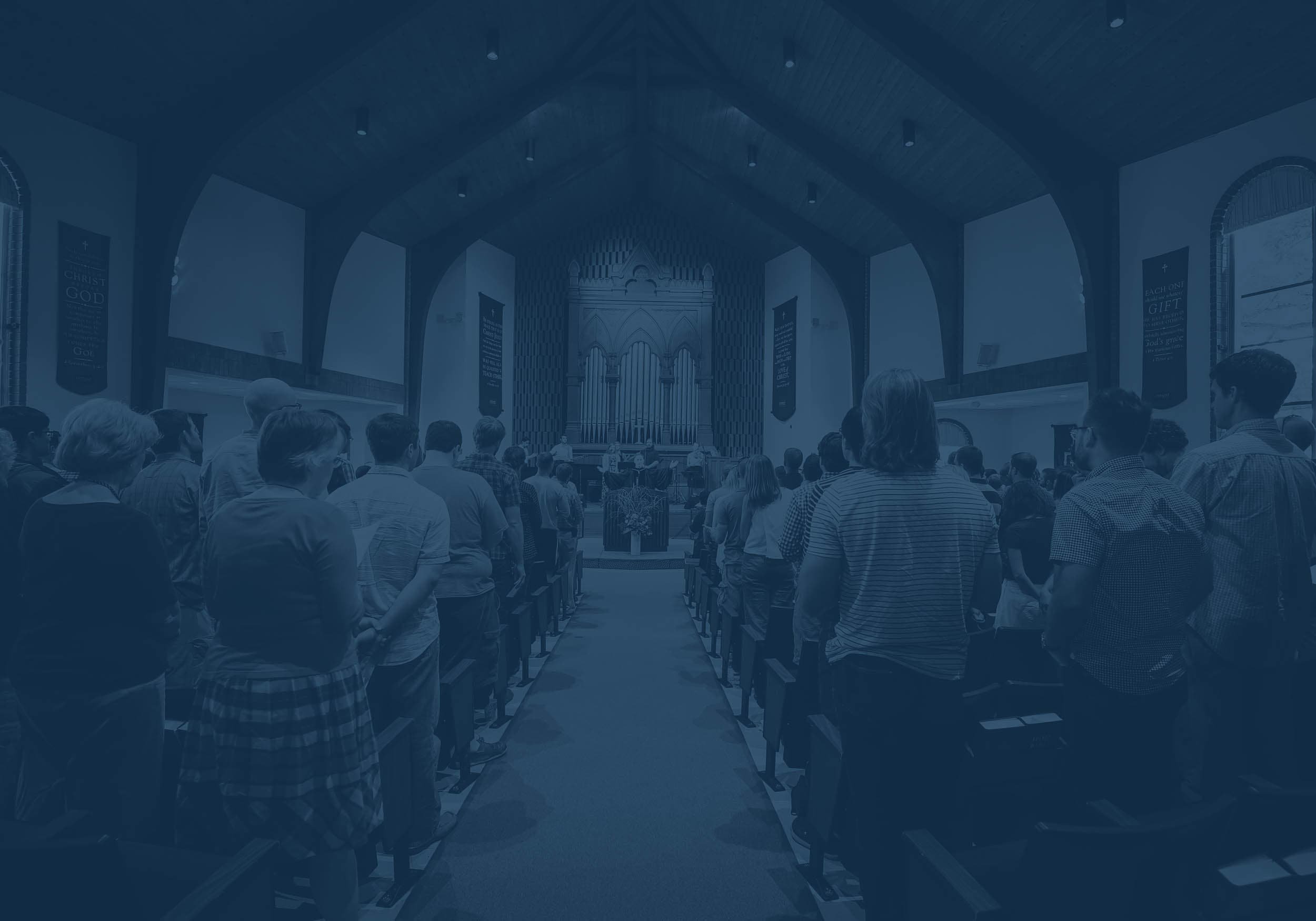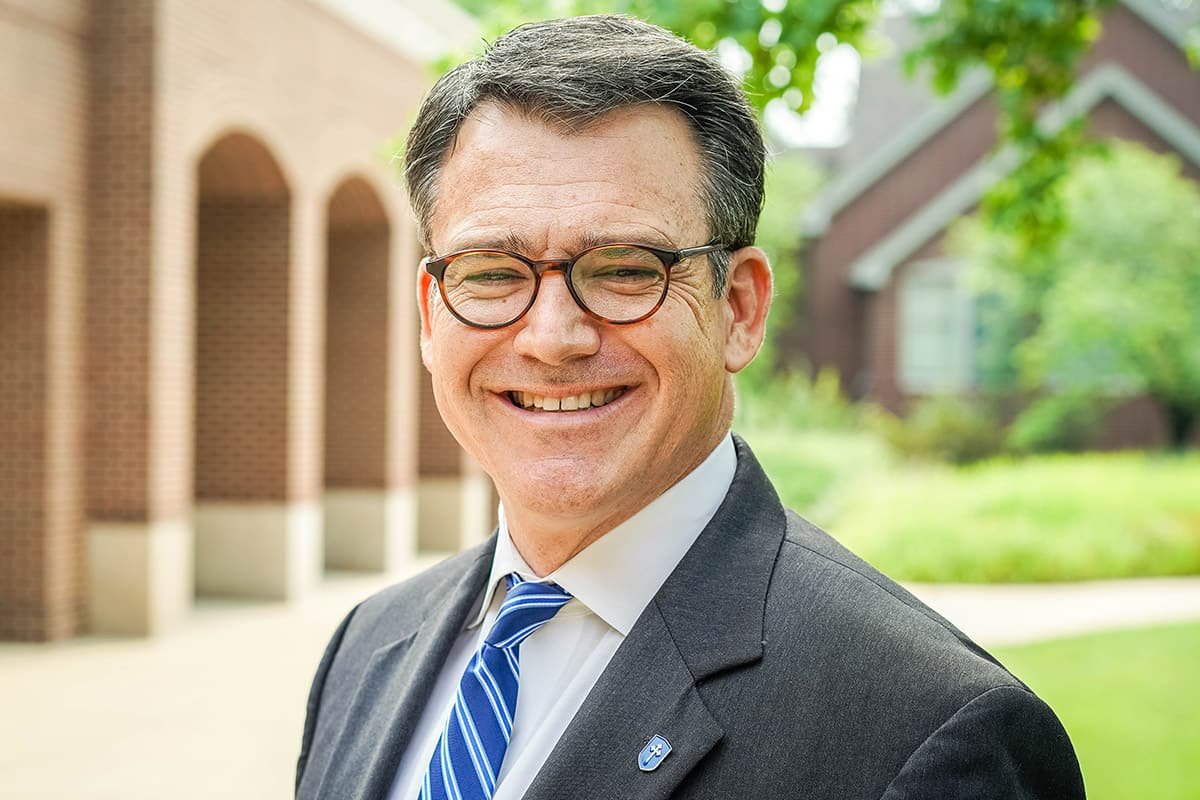
About Covenant Theological Seminary
For nearly 70 years, Covenant Theological Seminary has equipped men and women for the work of ministry. Covenant is the denominational seminary of the Presbyterian Church in America (PCA) and is the largest supplier of pastors into the PCA. We serve students from across a variety of denominations and have alumni serving in all 50 states and over 50 countries. We have trained thousands of people for ministry and would love to equip you for your calling.
Mission Statement
the purpose of Covenant theological Seminary is to glorify the triune God by training his servants to walk in God’s grace, minister God’s Word, and equip God’s people—all for God’s mission.

Theological Beliefs
While Covenant Seminary equips students from a variety of denominational backgrounds, we are the denominational seminary of the Presbyterian Church in America (PCA) and an official agency of the church. As such, all of our faculty submit themselves to the Bible as the true, inspired, and infallible word of God. Our faculty subscribe to the Westminster Confession of Faith, along with the Shorter and Larger Catechisms. You can find out more about the doctrinal commitments of the PCA here.
Covenant Seminary is the largest supplier of pastors into the PCA. We are thankful for the PCA’s history of pursuit of the gospel and commitment to the education of sound doctrine for its leaders, with which we have been entrusted.
Theological Identity
Biblical
Speaking through holy men, God graciously revealed himself to humanity in the sixty-six books of Scripture, the infallible record of his saving work. The writings of Scripture, and no others, constitute the Word of God, which is inspired, authoritative, inerrant in the original text, clear in its essentials, and sufficient to reveal what all should believe and do in every sphere of life. Scripture recounts and explains God’s covenantal redemption and his wisdom; it is both the record and the means of salvation. Disciples believe God’s revelation, heed his instruction, obey his commands, and trust his promises, so they are equipped for faithfulness and fruitfulness.
Reformed
The Reformation recovered the gospel of the free grace of God offered to all in Jesus Christ alone. Because of the devastating effects of sin, our only hope in life and in death is Jesus Christ and we gladly receive him and all his benefits by faith alone. Yet, even this faith is a gift of God, so that no one may boast. With this faith arising from the unconditional election of God, all true believers receive the benefits of Christ’s atonement, such that they walk in newness of life and persevere until the end. This gospel, far from being a private or merely religious matter, has implications for all of life. Jesus is Savior and Lord of all things—the gracious King who rules all creation for its good.
Confessional
Scripture is the foundation for both biblical and systematic theology. Since Scripture everywhere and in various ways invites us to praise the Triune God and recall his mighty acts of creation and redemption, we believe it essential to organize theology’s themes systematically for the edification and direction of the church. Though we gladly stand within the theological heritage of the universal church, we subscribe to the Westminster Standards as exhibiting Scripture’s system of doctrine. The doctrinal norm for the Presbyterian Church in America, the Standards decisively inform and shape our curriculum and mission.
Missional
God has a mission to unify all creation under Christ (Ephesians 1:9-10) and to reconcile all of creation through the cross and resurrection of Christ (Colossians 1:15-20). God invites his redeemed people into this mission, commissioned by him as ambassadors of our Savior-King Jesus Christ. Our theological heritage from Calvin onwards motivates us to connect the theological task of the seminary to the missionary impulse of the church. Theology is for the sake of the church and its mission.
Institutional Values
Our seven core values:
Christ-Centered Ministry
We believe that a seminary education is successful only if, at its end, the student knows Jesus Christ more intimately than at its beginning.
Biblical Authority
We believe that the Bible is the Word of God and thus it is our only infallible rule of faith and practice. We believe in the plenary, verbal inspiration of the Scriptures by the Holy Spirit, and thus we affirm the inerrancy of the original manuscripts whose objective truth it is our responsibility to interpret in accord with the principles of Scripture and to proclaim in accord with the imperatives of the Gospel.
Grace Foundation
We believe that the foundation for all that we do must be the gospel of grace—our absolute confidence in God’s acceptance of us provided through his redemptive work as the supreme motivation and enablement for love and holiness.
Relational Emphasis
We believe that the relationship between students and professors must take a meaningful place alongside teaching content, so that we may affect the entire character of the student for ministry. Therefore, we seek to develop a faculty of pastor-scholars and a staff which both individually and as a community effectively model what it means to walk with God, interpret and communicate God’s Word, and lead God’s people.
Pastoral Training
We believe that our primary task is to train students for pastoral ministry (including church planting, campus ministry, chaplaincy, and missionary service). To accomplish this task, we have gathered a faculty of pastor-scholars experienced in ministry (as understood by our denominational standards and institutional history), as well as other educational resources. These enable us to serve other students and the broader Christian community, while continuing to enhance pastoral training. To strengthen pastoral training and all of our educational programs, we continually seek to assess and improve student learning and development.
Church Leadership
We believe that, as the seminary of the PCA, it is our responsibility to provide intellectual training and ministry models that are true to the Westminster Standards and the historic distinctives of Presbyterian orthodoxy, while equipping the next generation of Christian servants for effective church leadership in a changing world. At the same time, because we recognize that a seminary alone can never fully equip students for these tasks, we seek to work in partnership with local churches to accomplish our purpose.
Kingdom Perspective
We believe that God’s purpose is the gathering of his people from every nation and the renewal of all things. He calls his church to active involvement with the world’s peoples and cultures, carrying out the mission of bringing the Gospel to those who do not believe and expressing Christ’s lordship in every area of life. In order to train students to make disciples of the nations, our faculty, staff, and students must increasingly reflect the ethnic and cultural richness of God’s worldwide church.
Covenant Theological Seminary is accredited by the Commission on Accrediting of the Association of Theological Schools in the United States and Canada, and by The Higher Learning Commission. Click here for more information.

History
In 1956, Covenant College and Theological Seminary began in St. Louis as educational training institutions for the Bible Presbyterian Church. The roots of the Bible Presbyterian Church began with the first American Presbytery of 1706. Covenant Seminary stands in the tradition dating back to the first theological schools of the American Presbyterian Church–the Log College at Neshaminy, Pennsylvania, and the college and seminary at Princeton.
The college was named “Covenant”–an expression used almost 300 times in the Bible to describe God’s grace to his people and his people’s response. It was also a word that commemorated the heroic struggle of Scottish Presbyterians to found and maintain a church for “Christ’s crown and covenant” against the claims of popes and kings.
As both Covenant College and Covenant Seminary grew, it was determined that the two institutions would quickly run out of space beyond their property in St. Louis County. Thus Covenant College relocated to Lookout Mountain, Georgia, where it remains today. Both Covenant College and Covenant Theological Seminary are governed by their own boards.
In 1982, Covenant Seminary became the official seminary of the Presbyterian Church in America as a part of the “joining and receiving” process of consolidating Presbyterian denominations centered upon the Bible as the inerrant and inspired word of God. Today Covenant Seminary is an official agency of the Presbyterian Church in America, and trains students from across denominations in the Bible, counseling, and ministry. The mission of Covenant Seminary to equip Reformed pastors, counselors, and ministry leaders in the Bible and ministry remains unchanged.

President
Rev. Dr. Thomas C. Gibbs
Dr. Tom Gibbs became the President of Covenant Theological Seminary after more than twenty years in pastoral ministry.
Board of Trustees
Covenant is the only seminary whose board of trustees is approved each year by the General Assembly of the Presbyterian Church in America. All voting board members are either Ruling Elders (RE) or Teaching Elders (TE) in the PCA.
Board Members
TE Dr. Jimmy Agan
RE Dr. James Albritton
TE Rev. Dr. Brian Cosby
RE Mr. David Duren
RE Mr. Mark Ensio
RE Dr. John Fitch
TE Rev. Dr. Bob Flayhart
RE Mr. Sam Graham
RE Dr. Miles Gresham
RE Dr. Donald Guthrie
TE Rev. Brian Habig
RE Mr. Bruce Harrington
RE Mr. Doug Hickel
RE Mr. Dwight Jones
TE Rev. Ryan Laughlin
TE Rev. Dr. Murray Lee
RE Mr. Ronald McNalley
RE Dr. C. Scott Shidemantle
TE Rev. Dr. David Sinclair
TE Rev. Dr. Russ St. John
RE Mr. Paul Stoll
RE Mr. Gif Thornton
RE Mr. Walt Turner













